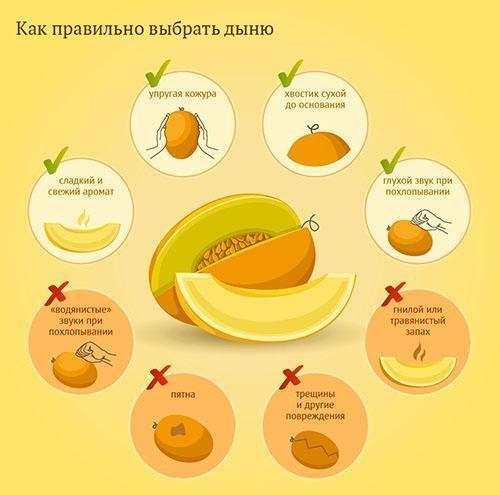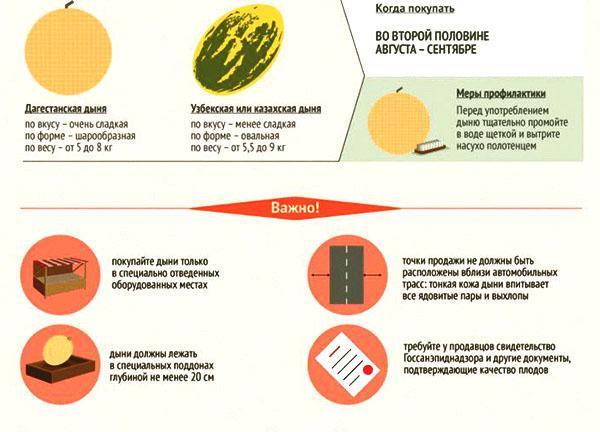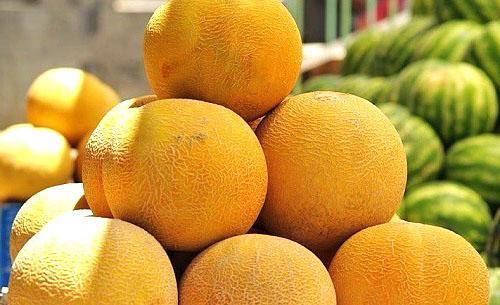Do you know how to choose the right ripe, sweet melon?
 The end of summer and the beginning of autumn is a great time when we begin to eat plenty of melons and gourds. Melon is the leader among them, according to consumers (as well as watermelons).
The end of summer and the beginning of autumn is a great time when we begin to eat plenty of melons and gourds. Melon is the leader among them, according to consumers (as well as watermelons).
Pleasant sweetness, juiciness, a whole group of useful properties, satiety - all these are signs of a good melon. And how to choose the right ripe melon that will delight us with its taste and will bring exceptional benefits? This will be discussed in our article.
Choosing the best melon on the counter

We take the melon in our hands and feel it: it should spring. This means the ripeness of the fruit. A hard surface in unripe melons, soft, on which marks remain - overripe, has lost its taste and useful properties. When you pat a ripe melon, you will hear a dull sound. If it “sounds” loud, then it would have to be more mature.
Let's summarize the main signs of a ripe delicious melon:
- She has a pleasant honey smell - you will not confuse it with anything. A good sign if you walk up to a tray of melons and smell them distinctly.
- Elastic - when you press your finger on the surface of the fetus, you feel how it is springy.
- Surface without greening, dents - most varieties have a yellow rind.
- On impact, a dull sound, not a ringing or "sinking" sound.
When setting the task of how to choose a good melon, take into account: it must be safe and sound! Spots, dents, cracks are good places for bacteria to spread. By purchasing melons with such surface defects, you run the risk of developing gastrointestinal diseases.
For the same reason, buying melon halves that have been cut in advance for the convenience of sale is also dangerous. Use the same principle to avoid tasting a slice of melon that a helpful vendor in the market might offer you. Disease-causing bacteria accumulate on both the tasting fruit and the knife.
Choosing the sweetest melon variety
Intending to buy a melon, we are looking for the sweetest, because it will be the most delicious for us. The taste qualities of this fruit depend not only on the degree of ripening, but also on the variety. So, how to choose a sweet melon in principle, we will orient ourselves a little in varieties.
The sweetest, and the most common, we have melons:
- "Kolkhoz woman" (large, with a smooth skin of bright yellow or greenish-yellow color with pronounced veins).

- Honey (with an oval shape, greenish or buffy pleasant color, incredible honey aroma and characteristic sweet taste).

- Pineapple melon (early, we first see it in stores; shape - oval, skin - smooth).

- Musky (one of the smallest varieties, with an oval shape, characteristic pronounced grooves).

The variety you like can be planted in your garden. By creating suitable conditions and caring for it, you will get your own crop of this crop.
 To taste self-grown melons at their best time, you should remove them from the bush in time. How is melon ripeness determined on garden bed, before ripping off?
To taste self-grown melons at their best time, you should remove them from the bush in time. How is melon ripeness determined on garden bed, before ripping off?
- The peduncle is dry or very sluggish.
- The fruits are no longer growing.
- Peel color characteristic of the variety (remember that the side warmed by the sun ripens first).
- Obvious pleasant aroma (in some varieties it happens if the skin is lightly rubbed).
When you cut a melon from a garden, do not be confused if there are some greenish areas in it. The fruit cannot ripen evenly at the same time, but the taste does not suffer from this.
Is it worth buying an unripe melon?
There is a tradition among the people: to buy several melons at once, moreover with greenery. They do this with the aim that the fruit, after lying on the balcony for several days, for example, will ripen and there will be no need to go to the store again. It would be more rational for a start to figure out: is the plucked melon ripening? The situation is as follows.
As the practice of melon breeders says, a melon, quite a bit unripe, may well reach the desired condition at home in a warm place.
This applies only to those cases when the melon is not quite ripe. However, such a fruit will taste slightly different from those that have ripened in the garden.
The ripening of the plucked melon is influenced by the variety, growing conditions and subsequent storage and other factors. Merchants use this property of the melon so that it does not reach the buyer overripe, hopelessly losing its wonderful taste.
Good place to buy melon
 Storage and transport conditions are important when it comes to melons. The best conditions are created in shops, supermarkets, trading floors - places of licensed food trade. Your best insurance in such cases is a sanitary inspection of trading places and conditions of sale of goods.
Storage and transport conditions are important when it comes to melons. The best conditions are created in shops, supermarkets, trading floors - places of licensed food trade. Your best insurance in such cases is a sanitary inspection of trading places and conditions of sale of goods.
It is strictly forbidden to purchase melons from street vendors along the roads! Exhaust gases, dust settle on the product, harmful substances are absorbed into the fruit through microcracks on the peel. These melons become unusable very soon, even if they were of excellent quality initially.
In conclusion, don't be afraid to overeat melons. This delicacy is a warehouse of necessary vitamins and minerals. Approach the choice of the fruit responsibly and prepared, then it will not disappoint you.